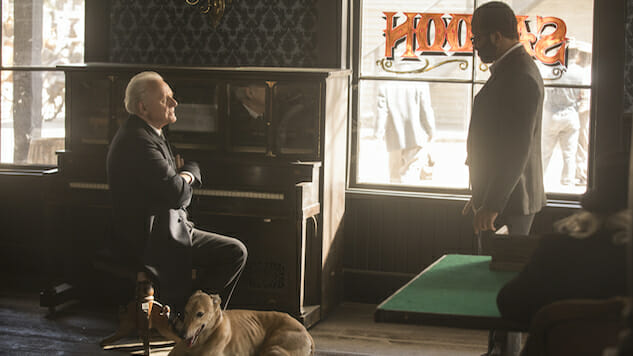Westworld Shifts the Balance of Who Gets to Play God, and Why, in “Les Écorchés”
(Episode 2.07)
Photo: John P. Johnson/HBO TV Reviews Westworld
If last week’s “Phase Space; was about the cycle of trial and errors that is creation, this week’s Westworld (“Les Écorchés”) is about how the very act of creation also implies destruction—and how the two are unavoidably linked. The act of playing God (and I do mean “playing”) comes in many forms in the multiple layers of Westworld’s reality, whether it’s the programmer-program relationship, the father-daughter relationship, the boss-lackey relationship, or the writer-character relationship. None of these even touch the outside world, and they’re only small diversions that add up to the second season’s slowly unveiled main secret. Well, the most central secret to the show’s world so far: Westworld’s purpose is to play God 2.0 and replicate life.
Not just any life, which Ford (Anthony Hopkins) explains to Bernard (Jeffrey Wright) in their letterboxed subroutine of Westworld’s larger program, but specific lives. This is more than cloning. This is immortality. Hence Ford’s life—intact and sane—inside the program while James Delos degenerated over the course of his Sisyphean punishment in the real world. As Ford explains the situation and the importance of Dolores (Evan Rachel Wood) as the host that helped rebuild her own creator, Arnold (whom Bernard is based upon), the episode drags. Unsurprising answers delivered in unsurprising ways make this a weird walk-and-talk sequence, but not an especially engaging one.
The surprise comes when Ford techno-possesses Bernard, putting a cybermonkey on his back and, for the first time, qualifying the Geek Squad for exorcism. Bernard’s had an interesting chronology this season, but a less interesting character arc. With the addition of a very focused creator inside the buggy creation, he becomes an engine rather than a calendar. Before it was “which Bernard is that?” Now it’s “which person inside Bernard is that?” The latter, even though director Nicole Kassell bludgeons us with reflections and match cuts that (almost like a 1980s possession movie) emphasize the god inside this machine, is much more fun to watch because it makes the Bernard segments feel like TV instead of a game of “spot the difference.”
Some of the Delos base action is lame just because of its predictability. A host seduces a security officer so she can blow up the host backup archive? Wouldn’t literally anyone that worked for Delos know “don’t trust the former sex robots?” It’s like an Austin Powers scene done absolutely seriously. Her breasts all but open up to reveal her guns. Other moments, like the waltz-set fight scene as Bernard/Ford helps the hosts complete their scheme, are simply more of the generically choreographed set dressing that’s been behind the majority of the season’s (relatively juicy) plot. At some point, seeing a host blast a modern-day security officer with a revolver just isn’t exciting anymore.
Still, the episode’s weaker aspects are buoyed by its confrontations, which are uniformly strong. The Man in Black (Ed Harris), who’s been on a tear of getting his ass handed to him, gets his ass handed to him once again. And I can’t say I hate it. Anything that keeps Harris tweaking his grizzled old sourpuss rather than glowering in the comfort zone. A showdown with Maeve (Thandie Newton) and her techno-telekinesis ends with both riddled with bullets, both surviving, but neither happy.
William loses his closest ally (Clifton Collins, Jr.) and his hope for penance, while Maeve loses her daughter to the Ghost Nation, which is a frustrating elongation of a plot that isn’t nearly as interesting as the techno-goddamn-telekinesis that I mentioned earlier. That Lee’s (Simon Quarterman) guilty writer is going to save her from death after calling the cavalry on her is just another thread I’d rather see explored in detail. He at once fears and recognizes the agency of someone over which he held absolute control, and his back-and-forth morality on the subject is a very personal distillation of the show’s greatest sci-fi device. The power inversion here is one that’s echoed all over and theirs is its purest form.
A little less pure is the dynamic between Dolores and Teddy (James Marsden). Marsden shows off some action movie chops this episode—and they’re incredible. He’d make a great Terminator. You just feel so bad for him—so sweet, so deadly—as he’s tenderizing a black ops soldier’s face. Dolores is still getting razzed from all sides for her decision to be a ruthless hypocrite, whether it’s by Maeve or Charlotte Hale (Tessa Thompson, doing stellar work). Dolores, the consummate daughter/maiden that is to learn from patriarchs and be pursued by masculine champions, has fully committed to being a leader, with all the mistakes and hard decisions that brings.
One of those decisions is to outgrow (and kill) her dad. To get his brain. Dolores is losing her last bits of humanity in pursuit of her first taste of it—it’s like watching someone go into serious debt while they get a finance degree. Except with dads and brains. But to her, it’s still worth it. Her confidence is what makes her so fun to watch and so exciting to predict as she rides towards the conclusion of the Valley Beyond. The shifting balance of who’s playing God and to what end is heading towards a clash of the titans, with every side emboldened by power and the promise of their own Valhalla—be it freedom for their species or freedom from death.
Jacob Oller is a writer and film critic whose writing has appeared in The Guardian, Playboy, Roger Ebert, Film School Rejects, Chicagoist, Vague Visages, and other publications. He lives in Chicago, plays Dungeons and Dragons, and struggles not to kill his two cats daily. You can follow him on Twitter here: @jacoboller.